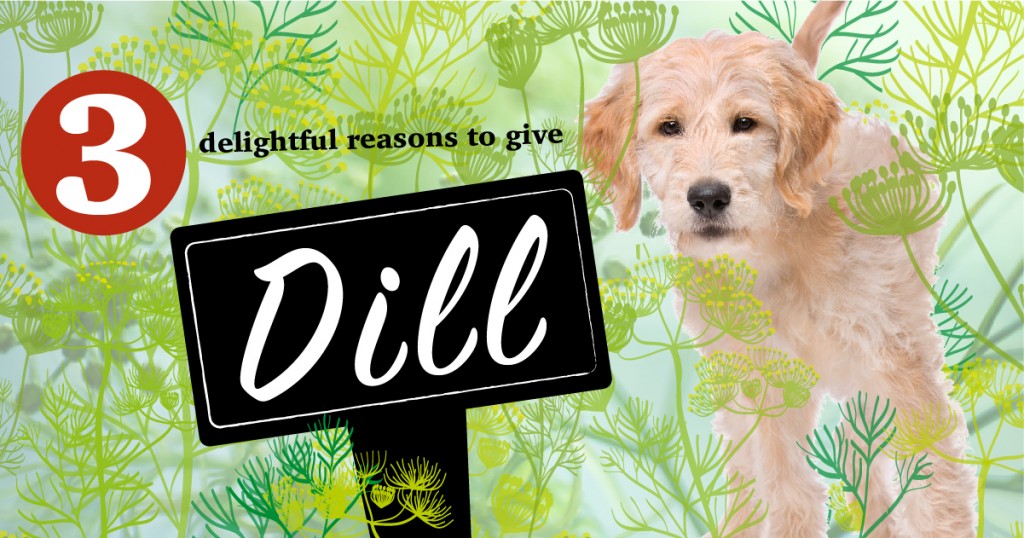|
When I think of dill, the first thing that comes to mind is sweet dill pickles or the seasoning on a grilled salmon fillet.
What may not quickly come to mind is dill as a stomach-soother and breath freshener – and certainly not as an antibacterial. But that’s the beauty of food, isn’t it? If you find the right one, it might just be the thing that fixes what ails your dog. Part of the parsley family, a sprinkle or drop of the oil of this fun little herb could benefit your dog in one or more of these three ways: Digestion If your dog is a living vacuum cleaner – picking up any food seconds after it falls on the ground – or if the garbage can is his idea of a buffet, it’s a good idea to keep some dill on hand. It’s known as an overall digestive aid, helping with gas, nausea, cramping and appetite. Breath Freshener Since dill is a member of the parsley family, it’s really not that surprising that dill would also work as a breath freshener. According to Herbs for Pets by Gregory L. Tilford and Mary L. Wulff, dill’s breath freshening action comes from its antibacterial powers that work well in the mouth for foul breath caused by bacteria and even gingivitis. Antioxidant Dill contains antioxidant flavonoids, including kaempferol and vicenin. Kaempferol has been linked to health benefits, including anti-inflammatory, anti-cancer, cardio-protective, neuro-protective and anti-diabetic; whereas vicenin helps protect cells and chromosomes from oxygen-based damage, radiation and damage caused by free radicals. Free radical damage can lead to chronic disease like cancer, joint and organ diseases. And antioxidants are the antidote to out-of-control free radicals. Learn more about free radicals, antioxidants and how food can help, here. Dill also contains volatile oils like limonene that may help increase production of cancer-fighting enzymes (Herbs for Pets). How to Feed Dill Make dill seed tea with 1 tsp. of dill seed to 8 oz. of water and feed 2-8 oz. to your dog once it is cooled. If your dog isn’t fond of the taste, you can use unsalted broth instead of water (Herbs for Pets). As always, if you have any questions, check with your holistic vet, and use with caution in pregnant or lactating animals. If you’re a fan of dill and keep it handy in your kitchen, consider it the next time your dog gets gassy after garbage surfing or is in need of a little bit of breath freshening. new blog posts on developing site www.pawsitivewellnesscenter.com
0 Comments
Your comment will be posted after it is approved.
Leave a Reply. |
Blog CreatorMary DeRoche Archives
April 2024
Categories
All
|
DISCLAIMER: I, Mary DeRoche, am not a veterinarian and do not practice medicine. I do not diagnose, cure, heal, treat disease or otherwise prescribe medication. I assist people in working with their animals in correcting energetic imbalances in their pet’s bio-field that assists the body to release its innate healing ability. When the energy chi of the body is balanced and moving correctly, the body’s innate natural energy heals itself. All healing is self-healing. Animals are affected by their environment so I also include the pet parents in my work. Animals do pick up energy from their family and environment. I only recommend the use of therapeutic grade essential oils for your pets because therapeutic grade essential oils have been tested to guarantee that they are free of synthetics, additives, toxins and any other impurities, which can result in side effects and/or inconsistent results. Essential oils and supplements are recommendations to help boost the pet’s immune system.
I recommend that clients continue to see their pet’s regular veterinarian and follow their advice and my work is a complement to regular allopathic medicine. My spiritual energy work is not a substitute for conventional medical diagnosis or treatment for any medical or psychological condition. For such issues, you should seek the proper licensed veterinarian. I am a Healing Touch for Animals Practitioner and a Subtle Energy Practitioner and my work is spiritually and energetically based and I believe all healing is spiritual in nature. I do not make any promises, warranties or guarantees about results of my work, or of the energy sessions. The energy sessions help many animals but like any energy work, it might not work for everyone. The use of essential oils, herbs and supplements is to assist the pet with balancing chakra centers for proper energy flow or chi.
© 2013~2023 Pawsitive Wellness Center All Rights Reserved.
I recommend that clients continue to see their pet’s regular veterinarian and follow their advice and my work is a complement to regular allopathic medicine. My spiritual energy work is not a substitute for conventional medical diagnosis or treatment for any medical or psychological condition. For such issues, you should seek the proper licensed veterinarian. I am a Healing Touch for Animals Practitioner and a Subtle Energy Practitioner and my work is spiritually and energetically based and I believe all healing is spiritual in nature. I do not make any promises, warranties or guarantees about results of my work, or of the energy sessions. The energy sessions help many animals but like any energy work, it might not work for everyone. The use of essential oils, herbs and supplements is to assist the pet with balancing chakra centers for proper energy flow or chi.
© 2013~2023 Pawsitive Wellness Center All Rights Reserved.


 RSS Feed
RSS Feed